14 start with M start with M

In the first in-depth treatment of this foundational legal case, authors Margaret A. Nash and Karen L. Graves tell the story of that case and of Marjorie Rowland, the pioneer who fought for employment rights for LGBTQ educators and who paid a heavy price for that fight. It brings the story of LGBTQ educators’ rights to the present, including commentary on Bostock v Clayton County, the 2020 Supreme Court case that struck down employment discrimination against LGBT workers.
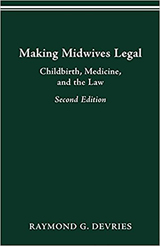


Susan Staves’s venture in feminist critical legal history is a comprehensive account of the changing laws governing married women’s property and a critical analysis of those laws and the ideology behind them. Staves offers an argument differing sharply from conventional appraisals of rule change as “progress.” She shows that, although there was a brief period in the mid-eighteenth century when contract law was applied to women’s rights to own and dispose of property, the results were socially intolerable, and the courts soon retreated to the older patriarchal structures that deprived married women of full ownership of property.
These patriarchal structures had always functioned to facilitate the transmission of significant property from male to male. Entitlements of women were designed to provide them with subsistence for themselves and minor children dependent upon them and to prevent their becoming an expense to the community. In examining several species of married women’s property—dower, jointure, pin money, and separate maintenance allowances—Staves shows that, despite the supposed importance of the of precedent in the legal system, judges had considerable room to maneuver and acted on their own ideological biases.
This story is packed with human interest and illustrative anecdote. Staves uses vivid examples from literature of the times, including plays such as Vanbrugh’s Relapse, Congreve’s Way of the World, and Sheridan’s School for Scandal, and novels like Tom Jones and Pride and Prejudice. Her book will interest a diverse audience of historians, legal scholars, students of eighteenth-century culture and literature, and general readers concerned with women’s issues.
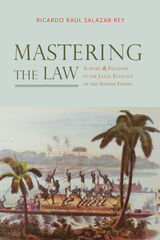
Atlantic slavery can be overwhelming in its immensity and brutality, as it involved more than 15 million souls forcibly displaced by European imperialism and consumed in building the global economy. Mastering the Law: Slavery and Freedom in the Legal Ecology of the Spanish Empire lays out the deep history of Iberian slavery, explores its role in the Spanish Indies, and shows how Africans and their descendants used and shaped the legal system as they established their place in Iberoamerican society during the seventeenth century.
Ricardo Raúl Salazar Rey places the institution of slavery and the people involved with it at the center of the creation story of Latin America. Iberoamerican customs and laws and the institutions that enforced them provided a common language and a forum to resolve disputes for Spanish subjects, including enslaved and freedpeople. The rules through which Iberian conquerors, settlers, and administrators incorporated Africans into the expanding Empire were developed out of the need of a distant crown to find an enforceable consensus. Africans and their mestizo descendants, in turn, used and therefore molded Spanish institutions to serve their interests.Salazar Rey mined extensively the archives of secular and religious courts, which are full of complex disputes, unexpected subversions, and tactical alliances among enslaved people, freedpeople, and the crown.
The narrative unfolds around vignettes that show Afroiberians building their lives while facing exploitation and inequality enforced through violence. Salazar Rey deals mostly with cases originating from Cartagena de Indias, a major Atlantic port city that supported the conquest and rule of the Indies. His work recovers the voices and indomitable ingenuity that enslaved people and their descendants displayed when engaging with the Spanish legal ecology. The social relationships animating the case studies represent the broader African experience in the Americas during the sixteenth and seventeenth centuries.
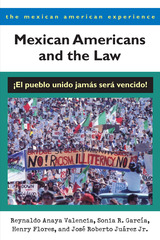
Each chapter highlights historical contexts, relevant laws, and policy concerns for a specific issue and features abridged versions of significant state and federal cases involving Mexican Americans. Beginning with People v. Zammora (1940), the trial that was a precursor to the Zoot Suit Riots in Los Angeles during World War II, the authors lead students through some of the most important and precedent-setting cases in American law:
- Educational equality: from segregation concerns in Méndez v. Westminster (1946) to unequal funding in San Antonio Independent School District vs. Rodríguez (1973)
- Gender issues: reproductive rights in Madrigal v. Quilligan (1981), workplace discrimination in EEOC v. Hacienda Hotel (1989), sexual violence in Aguirre-Cervantes v. INS (2001)
- Language rights: Ýñiguez v. Arizonans for Official English (1995), García v. Gloor (1980), Serna v. Portales Municipal Schools (1974)
- Immigration-: search and seizure questions in U.S. v. Brignoni-Ponce (1975) and U.S. v. Martínez-Fuerte (1976); public benefits issues in Plyler v. Doe (1982) and League of United Latin American Citizens v. Wilson (1997)
- Voting rights: redistricting in White v. Regester (1973) and Bush v. Vera (1996)
- Affirmative action: Hopwood v. State of Texas (1996) and Coalition for Economic Equity v. Wilson (1997)
- Criminal justice issues: equal protection in Hernández v. Texas (1954); jury service in Hernández v. New York (1991); self incrimination in Miranda v. Arizona (1966); access to legal counsel in Escobedo v. Illinois (1964)
With coverage as timely as the 2003 Supreme Court decision on affirmative action, Mexican Americans and the Law offers invaluable insight into legal issues that have impacted Mexican Americans, other Latinos, other racial minorities, and all Americans. Discussion questions, suggested readings, and Internet sources help students better comprehend the intricacies of law.
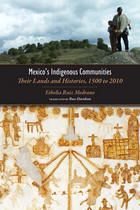
Ethelia Ruiz Medrano focuses on a series of individual cases, falling within successive historical epochs, that illustrate how the practice of drawing up and preserving historical documents-in particular, maps, oral accounts, and painted manuscripts-has been a determining factor in the history of Mexico's Indian communities for a variety of purposes, including the significant issue of land and its rightful ownership. Since the sixteenth century, numerous Indian pueblos have presented colonial and national courts with historical evidence that defends their landholdings.
Because of its sweeping scope, groundbreaking research, and the author's intimate knowledge of specific communities, Mexico's Indigenous Communities is a unique and exceptional contribution to Mexican history. It will appeal to students and specialists of history, indigenous studies, ethnohistory, and anthropology of Latin America and Mexico

Minding Justice offers a comprehensive examination of the laws governing the punishment, detention, and protection of people with mental disabilities. Using famous cases such as those of John Hinckley, Andrea Yates, and Theodore Kaczynski, the book analyzes the insanity defense and related doctrines, the role of mental disability in sentencing, the laws that authorize commitment of "sexual predators" and others thought to be a threat to society, and the rules that restrict participation of mentally compromised individuals in the criminal and treatment decision-making processes.
Arguing that current legal doctrines are based on flawed premises and ignorance of the impairments caused by mental disability, Christopher Slobogin makes a case for revamping the insanity defense, abolishing the "guilty but mentally ill" verdict, prohibiting execution of people with mental disability, restructuring preventive detention, and redefining incompetency. A milestone in criminal mental health law, Minding Justice provides innovative solutions to ancient problems associated with criminal responsibility, protection of society from "dangerous" individuals, and the state's authority to act paternalistically.

In A Ministry of Presence, Winnifred Fallers Sullivan explores how chaplaincy works in the United States—and in particular how it sits uneasily at the intersection of law and religion, spiritual care, and government regulation. Responsible for ministering to the wandering souls of the globalized economy, the chaplain works with a clientele often unmarked by a specific religious identity, and does so on behalf of a secular institution, like a hospital. Sullivan's examination of the sometimes heroic but often deeply ambiguous work yields fascinating insights into contemporary spiritual life, the politics of religious freedom, and the never-ending negotiation of religion's place in American institutional life.
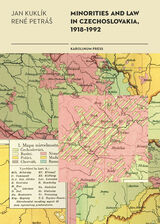
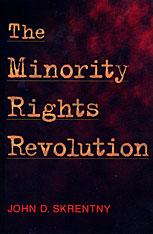
In the wake of the black civil rights movement, other disadvantaged groups of Americans began to make headway—Latinos, women, Asian Americans, and the disabled found themselves the beneficiaries of new laws and policies—and by the early 1970s a minority rights revolution was well underway. In the first book to take a broad perspective on this wide-ranging and far-reaching phenomenon, John D. Skrentny exposes the connections between the diverse actions and circumstances that contributed to this revolution—and that forever changed the face of American politics.
Though protest and lobbying played a role in bringing about new laws and regulations—touching everything from wheelchair access to women’s athletics to bilingual education—what Skrentny describes was not primarily a bottom-up story of radical confrontation. Rather, elites often led the way, and some of the most prominent advocates for expanding civil rights were the conservative Republicans who later emerged as these policies’ most vociferous opponents. This book traces the minority rights revolution back to its roots not only in the black civil rights movement but in the aftermath of World War II, in which a world consensus on equal rights emerged from the Allies’ triumph over the oppressive regimes of Nazi Germany and Imperial Japan, and then the Soviet Union. It also contrasts failed minority rights development for white ethnics and gays/lesbians with groups the government successfully categorized with African Americans. Investigating these links, Skrentny is able to present the world as America’s leaders saw it; and so, to show how and why familiar figures—such as Lyndon Johnson, Richard Nixon, and, remarkably enough, conservatives like Senator Barry Goldwater and Robert Bork—created and advanced policies that have made the country more egalitarian but left it perhaps as divided as ever.
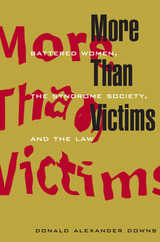
"More Than Victims is a powerful step in the right direction. Women as well as men need to be protected from violence, and women, in particular, require better understanding of their sometimes oppressive situations. But they also need to be able to participate fully in the discourse of politics and citizenship. Downs offers a solution that helps to make both possible."—Teresa Godwin Phelps, Review of Politics
"Downs has written an important book on a subject that deserves more of our attention."— Susan Mezey, Law and Politics Book Review
"Comprehensive and compelling. [Downs] demonstrates a masterful grasp of the complex legal and philosophical issues implicated in domestic violence cases."—Annette DeMichele, New York Law Journal
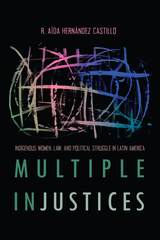
Multiple InJustices synthesizes R. Aída Hernández Castillo’s twenty-four years of activism and research among indigenous women’s organizations in Latin America. As both feminist and critical anthropologist, Hernández Castillo analyzes the context of legal pluralism wherein the indigenous women of Mexico, Guatemala, and Colombia struggle for justice. Through ethnographical research in community, state, and international justice, she reflects on the possibilities and limitations of customary, national, and international law for indigenous women.
Colonialism, racism, and patriarchal violence have been fundamental elements for the reproduction of capitalism, Hernández Castillo asserts. Only a social policy that offers economic alternatives based on distribution of wealth and a real recognition of cultural and political rights of indigenous peoples can counter the damage of outside forces such as drug cartels on indigenous lands.
She concludes that the theories of indigenous women on culture, tradition, and gender equity—as expressed in political documents, event reports, public discourse, and their intellectual writings—are key factors in the decolonization of Latin American feminisms and social justice for all.
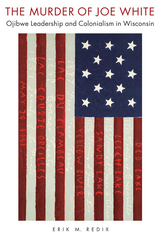
READERS
Browse our collection.
PUBLISHERS
See BiblioVault's publisher services.
STUDENT SERVICES
Files for college accessibility offices.
UChicago Accessibility Resources
home | accessibility | search | about | contact us
BiblioVault ® 2001 - 2024
The University of Chicago Press









